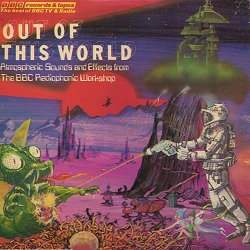| Out of This World | ||||
|---|---|---|---|---|
 | ||||
| Studio album by | ||||
| Released | 1976 | |||
| Genre | Electronic music, sound effects | |||
| Length | 43:21 | |||
| Label | BBC Records | |||
| Producer | Glynis Jones | |||
| BBC Radiophonic Workshop chronology | ||||
| ||||
Out of This World: Atmospheric Sounds and Effects from The BBC Radiophonic Workshop is a 1976 British commercial LP release of atmospheric sounds and effects from the library of the BBC Radiophonic Workshop. The album was divided into four sections (two on each side), each representing a different theme: "Outer Space", "Magic and Fantasy", "Suspense and the Supernatural" and "The Elements".
Contents
The album was produced by Glynis Jones and included sounds created by the various members of the Workshop. While many of the tracks are basic sound effects, such as those from the TV series Doctor Who , others are like ambient music, designed to create soundscapes rather than fulfilling a specific music or sound effects requirement.
The album was re-released on CD in 1991 in simulated stereo as Essential Science Fiction Sound Effects Vol. 2. It was released on vinyl LP by AudioGo and Discovery Records on 21 April 2012 as part of Record Store Day. [1]
Track 61, "Passing clouds", by Roger Limb, was used on "Eye No", the opening song on Prince's 1988 album Lovesexy . It was also released as "Clouds", but wrongly credited to Delia Derbyshire, on a 2-CD bootleg called "Wow!", released by "Eye" Records in 2008.
The track "Spring tide" by Glynis Jones is used in the fish scene on the River Caves ride at Blackpool Pleasure Beach